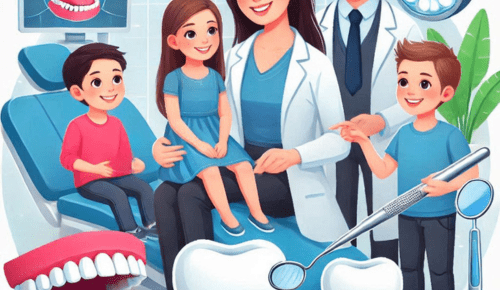Pediatric dentistry plays a unique role in caring for children’s oral health. Unlike adults, children have different needs and sensitivities. This makes pediatric dentistry a specialized field. Understanding these differences is important for parents and caregivers. Children’s teeth are still growing and developing. Their gums and oral tissues are also more sensitive. As a result, dental care requires a gentle and tailored approach. The Oshawa dentist knows this well. They focus on creating a comfortable and friendly environment for young patients. Pediatric dentists use specific techniques to help children feel relaxed and safe. They also ensure that dental care is effective and positive. The dentist’s goal is to establish healthy habits that last a lifetime. This includes teaching children the importance of regular brushing and flossing. By understanding these unique aspects, we can better support children’s dental health and ensure they grow up with strong, healthy smiles.
The Unique Needs of Children’s Teeth
Children’s teeth, often referred to as primary teeth, serve as placeholders for their permanent teeth. These teeth are softer and more prone to decay than adult teeth. This means that regular check-ups and cleanings are crucial. According to the Centers for Disease Control and Prevention, early childhood cavities remain a common issue. Understanding and addressing these problems early can prevent more serious issues later in life.
Developmental Differences
Children’s mouths are not just smaller versions of adult mouths. They are constantly changing as they grow. Pediatric dentists are trained to monitor these developmental changes closely. They can spot potential issues like misaligned teeth or bite problems early. This early detection allows for timely intervention, saving the child from discomfort and more complex treatments in the future.
Communication and Comfort
Communication with children requires a special touch. Pediatric dentists have a knack for explaining procedures in ways that are easy for children to understand. They use simple language and often incorporate fun elements into their practice. This helps in easing any anxiety the child might feel. Creating a positive experience at the dentist can lead to a lifetime of good dental habits.
Comparison of Pediatric vs. General Dentistry
| Aspect | Pediatric Dentistry | General Dentistry |
| Focus | Children’s developing teeth | Adult and adolescent teeth |
| Approach | Gentle and child-friendly | Standard adult techniques |
| Environment | Colorful, engaging, playful | Professional, straightforward |
| Communication Style | Simple, educational, engaging | Direct, informative |
Preventive Care and Education
Pediatric dentistry emphasizes prevention and education. Dentists teach children how to brush and floss effectively. They also advise parents on diet and habits that contribute to healthy teeth. For instance, limiting sugary snacks and drinks can significantly reduce the risk of cavities.
Fluoride treatments and dental sealants are often used as preventive measures. These treatments protect the teeth from decay. They are safe and effective ways to maintain strong, healthy teeth throughout childhood.
The Role of Parents
Parents play a key role in their child’s dental health. Encouraging regular dental visits and modeling good oral hygiene habits can set the foundation for a lifetime of healthy smiles. The American Dental Association provides resources and tips for parents to help care for their child’s teeth.
The Long-term Benefits
By focusing on pediatric dentistry, we help children develop strong, healthy teeth that last a lifetime. Early dental visits and proper care prevent complications. They teach children the value of maintaining their oral health. This leads to fewer dental problems in adulthood and contributes to overall well-being.
A positive dental experience in childhood fosters trust and reduces dental anxiety. It encourages children to continue visiting the dentist as they grow. This supports a cycle of good health practices that benefit them for years to come.
Understanding pediatric dentistry is not just about treating teeth. It is about nurturing a child’s overall health and well-being. By investing in specialized care, we give our children the best chance at a healthy future.

